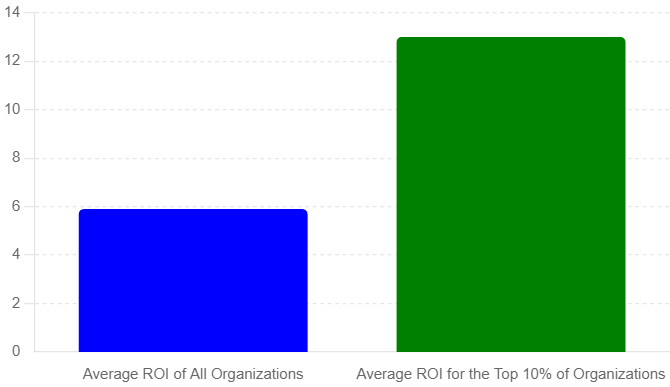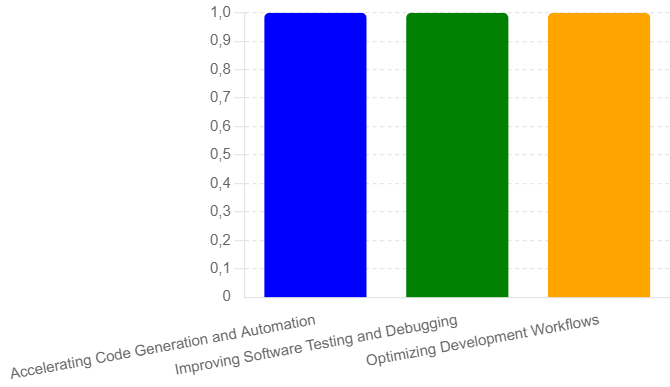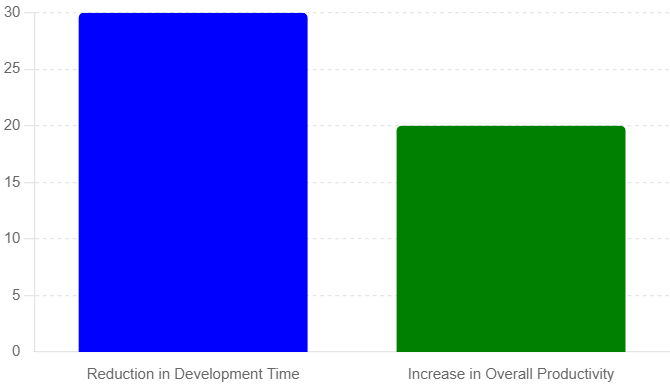-
Contents
- Definition of ROI in AI-Based Product Development
- Strategies to Increase the ROI of AI Projects
- Ensuring Data Quality and Management in AI-Based Software
- Engineering and Operations
- Importance of Generative AI in Maximizing ROI
- Accelerating Development Processes with Generative AI
- Mitigating Risks of AI-Based Software and Ensuring Compliance with AI Regulations
- Monitoring and Measuring ROI of AI-Based Software
- Leveraging External Expertise in Generative AI for Maximizing ROI of AI Initiatives

Definition of ROI in AI-Based Product Development
ROI in AI-based software development can be calculated as the net profit from AI initiatives divided by the total investment made on the projects. It is a holistic approach that encompasses the monetary benefits and values created by AI adoption.
Determining the ROI requires evaluating different factors such as cost reduction, sales revenue enhancement, organizational efficiency, and business gain. For instance, the implementation of AI can revolutionize operational costs by automating processes, boost sales through individual customer experiences, and optimize strategic decision-making.
As we have seen, many organizations are already benefiting from the opportunities that come with AI. As per the survey conducted by IBM, The business value of AI, organizations that have implemented AI at least in the pilot stage have reported double the financial performance of competitors. On average they report up to 6% direct improvements in their AI investments. Similarly, organizations that have moved to operating and/or optimization stages claim a return on investment of 10-12%.
Strategies to Increase the ROI of AI Projects
Analyzing the strategic management of AI ROI shows that there are substantial outcome disparities in AI initiatives and that most do not deliver the financial results expected by shareholders. According to the IBM Institute for Business Value, the use of AI across an enterprise returns only 5.9% return on investment, below the industry average 10% cost of capital. However, companies that attained a high level of AI maturity were able to obtain an ROI of 13%. This divergence indicates that the focus should be shifted from isolated AI initiatives, which are frequently non-strategic, unscalable, and ineffective, to integrating AI as a strategic cornerstone of the enterprise. AI is most effective when it is trustworthy, built on ethical frameworks, governed responsibly, and applied practically.

The IBM report Generating ROI with AI goes further to state that organizations need to move from ad hoc and isolated AI pilots to AI programs that are well integrated to realize the full potential of AI and deliver vast business value. This strategic shift is essential for increasing the level of ROI, as evidenced by a significant enhancement of return rates in more developed AI structures.
Ensuring Data Quality and Management in AI-Based Software
When it comes to AI-based software, the quality of data being fed into a model determines the accuracy of the model and the output, and hence, the success or failure of an AI project. This, in turn, means that accuracy, relevance, and completeness of data are critical factors that affect the performance and credibility of AI systems.
This means that organizations that are implementing better data management practices can hugely increase their AI returns. According to the MIT Sloan Management Review, businesses with excellent data quality enjoyed three times higher levels of improvement from AI than firms with poor data quality. On the other hand, a study by IBM reveals that businesses in the United States lose $3.1 trillion a year because of inadequate data quality. This underlines the need to invest more in data quality and guarantee that the underlying data for AI is sound and sufficiently large.
Data quality assurance means cleaning the data, validating it, and maintaining it to reduce or remove errors, inconsistencies, or bias. It also helps in improving efficiency and effectiveness and also increases the reliability of the AI-based software solutions developed.

Implementing Robust Data Governance
The essential characteristic of data management for the AI-based software project is data governance, which ensures the proper lifecycle of data. It refers to the process of developing a framework that will be used in the organization in order to address issues such as data quality, protection, and compliance. Data governance best practices cover data ownership, access, and usage control to avoid legal and ethical misconduct of data.
By Gartner’s estimation, organizations possessing sound data governance are 2.5 times more likely to achieve business goals through AI initiatives. This goes back to the need to embrace robust data governance strategies in an organization to facilitate generative AI initiatives.
Utilizing Data Analytics to Maximize AI Effectiveness
Most of the information generated today in enterprises is textual and is stored in documents, emails, social media posts, etc. It is believed that only about 20% of business data is structured hence, a huge amount of data is unexploited. Overlooking this, 70% to 80% of unstructured data adds up to a major opportunity cost for organizations.
Data mining is an important application that involves the processes of finding patterns within large datasets applicable in AI model development and optimization processes. Using complex analysis methods, businesses can improve their results of AI-based software projects and maintain the effectiveness of the models used.
Forrester’s report shows that firms that employed data analytics for AI projects benefited from a 45% boost in decision-making and a 35% enhancement in operational efficiency. These benefits show how data analytics can be of immense value to the overall optimization of generative AI-based software.
Engineering and Operations
AI at scale means that the process of implementation must be highly structured when it comes to engineering and operations which is called AIOps. This combines the best practices of Agile DevOps, automated IT operations, and Machine Learning operations or MLOps to make a smooth process of deploying AI. The organizations that master AIOps can advance their development cycles and enhance the cooperation between teams and divisions while also increasing organizational performance; the benefits can amount to up to 2. 6 times higher ROI.
Importance of Generative AI in Maximizing ROI
Generative Artificial Intelligence is a game-changer in achieving the highest ROI for product development. Generative AI can independently write code, design, and create content or even design new products and features given the vast datasets and state-of-the-art algorithms. This capability not only shortens the developmental cycle but also improves the quality and innovation of the outcomes. Here is a comprehensive guide to accelerated product development with AI.
A survey published by McKinsey & Company revealed that the companies using generative AI in development processes saw a reduction of development time to the range of 20-30% and an overall productivity boost of up to 20%. Furthermore, it makes it easier for generative AI to learn the data and adapt to new data making the solutions relevant and more efficient thus making the ROI higher.
Accelerating Development Processes with Generative AI

The application of generative AI can therefore transform the software development process through improvements in terms of time, quality, and efficacy. When generative AI is incorporated into one or more phases of the process, organizations can benefit from faster delivery, better product performance, and efficient processes. Below, we explore three key areas where generative AI can make a substantial impact: fostering code generation and automation, enhancing software testing and code debugging, and optimizing development processes.
Accelerating Code Generation and Automation
Generative AI is also very good at tasks that are repetitive and time-consuming such as writing code. The generative subset of AI can use sophisticated algorithms and machine learning to generate code fragments, modules, or even applications based on certain specifications and patterns. This capability not only makes the process faster but also minimizes the chances of an error due to human intervention.
For example, GitHub Copilot, an AI code generation tool created by OpenAI and GitHub, is very effective in code completion and suggestion. In a survey conducted by GitHub, it was revealed that users of Copilot saw a 55% boost in productivity, which enabled them to concentrate on more innovative and challenging aspects of software construction.
Improving Software Testing and Debugging
Software testing and debugging are important phases in the development life cycle, which are time-consuming and resource-intensive. These processes can be improved by generative AI. It will automatically create test cases, detect possible bugs, and even provide suggestions on how to solve them. Automated testing tools powered by artificial intelligence can compare code changes to the rest of the system, identifying significant portions of code that could be overlooked but must be tested for defects.
For instance, there is a testing tool called Diffblue Cover that employs generative AI for generating unit tests for Java applications. It can enhance the test coverage by up to 25% and thus, reduce the manual effort in testing and provide a faster way of isolating and addressing the bugs.
Optimizing Development Workflows
Generative AI can help streamline developmental processes by giving suggestions based on data analysis and pattern recognition. AI can also use historical project data to qualify bottlenecks, predict possible delays, and recommend changes to the workflow. Such an approach allows development teams to avoid potential problems, improve processes, and increase productivity.

A study conducted by McKinsey & Company reveals that companies that adopted AI for workflow enhancement in the development process benefited from a 20% increase in development productivity and a 30% decrease in time to market. These enhancements are because AI offers real-time feedback, identifies priorities, and assists in better management of resources.
Generative AI proves to be beneficial in software development by increasing the speed of code generation, automating the testing and debugging process, and streamlining the process of development. These advancements not only result in a shorter time to develop but also a better quality of the products and improvement in ROI. As generative AI is increasingly used and incorporated into the development process, organizations will observe significant uplifts in efficacy, creativity, and organizational performance.
Mitigating Risks of AI-Based Software and Ensuring Compliance with AI Regulations
AI-based software solutions have inherent risks and legal concerns that have to be met to harness the technology responsibly, efficiently, and legally. Reducing potential risks, avoiding violations of applicable rules, and using ethical principles in AI-related activities will help minimize adverse effects and promote confidence in AI activities.
- The AI models tend to mimic the dataset fed to them and thus may contain biases and create or perpetuate unfairness or discrimination.
- AI-based software systems may be vulnerable to adversarial attacks and data leakage that can compromise personal information.
- When the output generated by the AI does not align with the business outcomes, there are possibilities it becomes inefficient or can cause other problems.
To address these risks, organizations should:
- Regularly audit AI models for biases and implement corrective measures to ensure fairness and inclusivity.
- Strengthen security protocols, including encryption, access controls, and regular vulnerability assessments.
- Continuously review and adjust AI strategies to ensure alignment with organizational goals and objectives.
- Ensure compliance with AI regulations. Compliance with regulatory requirements is crucial for avoiding legal repercussions and maintaining public trust. For example, a report by Accenture highlights that 80% of companies implementing AI face regulatory compliance challenges, underscoring the importance of a robust compliance framework.
According to a study by the World Economic Forum, organizations that prioritize ethical AI practices are more likely to gain user trust and achieve long-term success with their AI initiatives. Read more about AI ethics for enterprises.
Monitoring and Measuring ROI of AI-Based Software
The key to successfully implementing AI projects is to be able to track and evaluate the ROI of the required changes. Organizing ROI audits from time to time is crucial so that investment and strategic outcomes of generative AI initiatives can be measured. According to the study conducted by PwC, it was revealed that organizations that were carrying out the ROI evaluation of their AI projects were able to enhance the overall success rate of the project by 40% stating the need for constant check and balance.
Key Performance Indicators (KPIs) for Generative AI Projects
KPIs are specific targets that allow for the assessment of the effectiveness of applied AI-based software. These indicators should align with the specific objectives and goals of the AI initiative and may include:
- Development Efficiency. Quantifies the reduction in the development time because of generative AI, for example, code generation time or testing time.
- Cost Savings. Estimates the amount of money that organizations can save through reduction of costs related to labor, errors, and amount of automation.
- Quality Improvements. Evaluates the improvement in product quality like the number of bugs, and the general satisfaction level of users.
- Time-to-Market. Measures the rate of speeding up of product development timelines and the rate of product release.
- User Adoption and Engagement. Oversees the consumption and implementation of AI-based software by the clients.
- A survey carried out by Deloitte showed that organizations with established KPIs for their AI projects realized enhanced achievement of their intended objectives since they were 60% more likely to succeed than organizations without such measures.
Leveraging External Expertise in Generative AI for Maximizing ROI of AI Initiatives
Generative AI is a rapidly evolving field that demands a lot of expertise. In this way, organizations can advance AI development and application, improve data credibility, eliminate risks, and provide reliable quality assurance (QA), increasing the overall ROI with the help of external specialists and AI partners such as Processica.
Accelerating Development and Deployment
External experts bring deep knowledge and experience, enabling:
- Rapid prototyping
- Optimized processes
- Technology integration
According to McKinsey & Company, companies that outsource with AI consultants reduce development time by half, accelerating the time-to-market and increasing the ROI.
Enhancing Data Validation
Data plays a crucial role in any AI project, and it should be of the highest quality. External experts assist in:
1. Data Cleansing and Preprocessing. Detecting and eliminating mistakes and prejudices.
2. Advanced Validation Techniques. Cross-validation and anomaly detection techniques are some of the methods that can be employed.
Gartner’s study shows that engaging external data experts improves data quality by 40%, leading to more reliable AI models.
Mitigating Risks
In terms of the drawbacks, it is crucial to understand that like any other generative AI, projects related to it have drawbacks like biases and security concerns. External experts help by:
1. Bias Detection and Mitigation
2. Security Assessments
3. Ethical AI Implementation
According to Accenture, the utilization of external AI specialists decreases the risk by 30% and increases the reliability of projects.
Performing Robust QA of AI Systems
Quality assurance makes it possible for an AI-based software system to function as intended. External experts provide:
- Comprehensive Testing
- Performance Monitoring
- Continuous Improvement
According to Forrester, organizations that resort to external QA services gain a 25% enhancement in system reliability and a 20% reduction in post-deployment problems.
Incorporation of third-party assistance in generative AI improves the speed of development, enhances the quality of data collected, minimizes risks, and makes sure that there is high-quality assurance. These benefits consequently result in shorter time-to-market of the developed AI-based software solutions, enhanced solution quality, and improved ROI. To learn more. Contact Processica to talk about your AI project requirements and the best approach.



